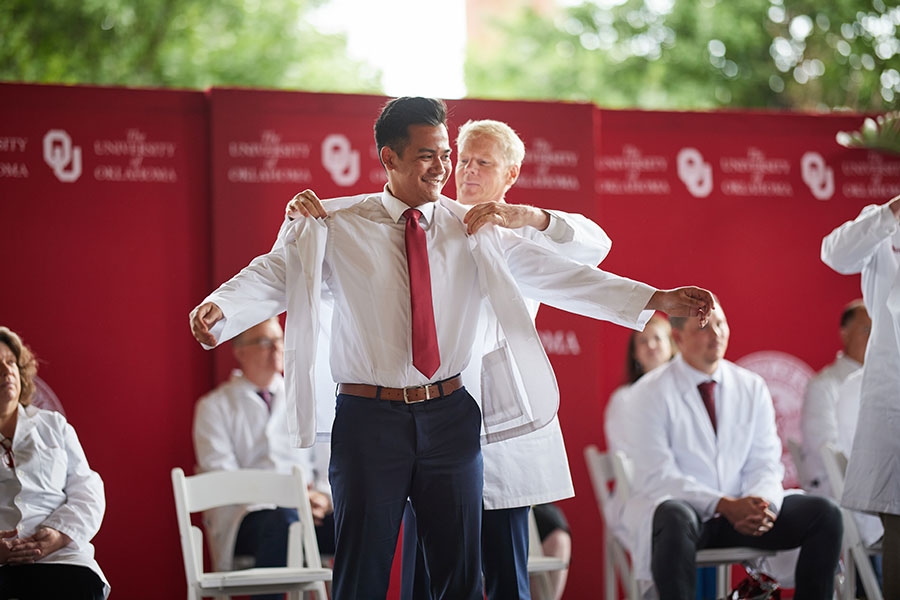
OKLAHOMA CITY, OKLA. — The White Coat Ceremony holds a special place in the hearts of aspiring clinicians. It marks the next phase of their medical education as they begin their first-year orientation.
For many, it marks a moment when the dream of becoming a healthcare professional becomes real.
The transition is both ceremonial and pragmatic. Students move from the classroom to the clinic, where they now gain first-hand experience necessary for their profession.
“The White Coat Ceremony marks a pivotal moment in the journey of our health sciences students,” said Gary E. Raskob, Ph.D., Senior Vice President and Provost at the University of Oklahoma Health Sciences Center. “It serves as a reminder of the sacred trust between healthcare professionals and their patients.”
The eponymous white coat, iconic in its symbolism of the medical profession, is placed on each student during the ceremony before the Oaths of Commitment. Tracing its roots to the days of the classical Greek physician and philosopher Hippocrates, the oath is the verbal rite of passage each student must take during the ceremony.
Each cohort recites oaths specific to their college or campus. The central messages of honor, respect, humility and the life habit of pursuing more education are consistent.
The OU Health Sciences all champion humanism within healthcare – a tenant of the Gold Foundation, which supports the Gold Humanism Honor Society within the College of Medicine. Of the varied Oaths of Commitment, all promote experts, learners, and leaders to together create systems and cultures that support humanistic care for all.
OU’s first White Coat Ceremony occurred in 1997 with the College of Medicine, funded through a grant provided by The Arnold P. Gold Foundation that fosters humanism in medicine. This year, OU Health Sciences held multiple White Coat Ceremonies where nearly 500 students from the OU Colleges of Medicine, Dentistry, Nursing, Allied Health, and Pharmacy celebrated this milestone. An additional 30 students were recognized during the OU Health Sciences biomedical sciences program’s “lab coat ceremony” which likewise recognizes this milestone of students’ education.
“As our students don their white coats, it signifies their commitment to upholding the highest standards of compassion, integrity, and excellence in patient care,” added Raskob.
These students will go on to complete their degrees, with many choosing to serve in their home communities supporting the health and wellness of Oklahomans across the state.
About the University of Oklahoma Health Sciences
The University of Oklahoma Health Sciences is one of the nation’s few academic health centers with all health professions colleges — Allied Health, Dentistry, Medicine, Nursing, Pharmacy, Public Health, Graduate Studies and School of Community Medicine. OU Health Sciences serves approximately 4,000 students in more than 70 undergraduate and graduate degree programs on campuses in Oklahoma City and Tulsa and is the academic and research partner of OU Health, the state’s only comprehensive academic healthcare system. The OU Health Sciences is ranked 122 out of 2,886 institutions in funding received from the National Institutes of Health, according to the Blue Ridge Institute for Medical Research. For more information, visit ouhsc.edu.
About the University of Oklahoma
Founded in 1890, the University of Oklahoma is a public research university located in Norman, Oklahoma. As the state’s flagship university, OU serves the educational, cultural, economic and health care needs of the state, region and nation. OU was named the state’s highest-ranking university in U.S. News & World Report’s most recent Best Colleges list. For more information about the university, visit ou.edu.
To combat power outages and extreme weather events, a team led by University of Oklahoma researchers has helped launch a project utilizing electric school buses as a backup energy resource.
The University of Oklahoma Health Campus was recently recognized for its increased momentum in advancing discoveries that change lives, achieving the state’s first Top 100 national ranking based on funding from the National Institutes of Health, according to the Blue Ridge Institute for Medical Research. The ranking—the highest in OU’s history and in the state—solidifies the University’s position as the state’s leading driver of health-related research.
Stefano Tarantini, an assistant professor in the Department of Neurosurgery at the University of Oklahoma College of Medicine, spends his days in the laboratory searching for answers to the cognitive decline that too often plagues older adults.